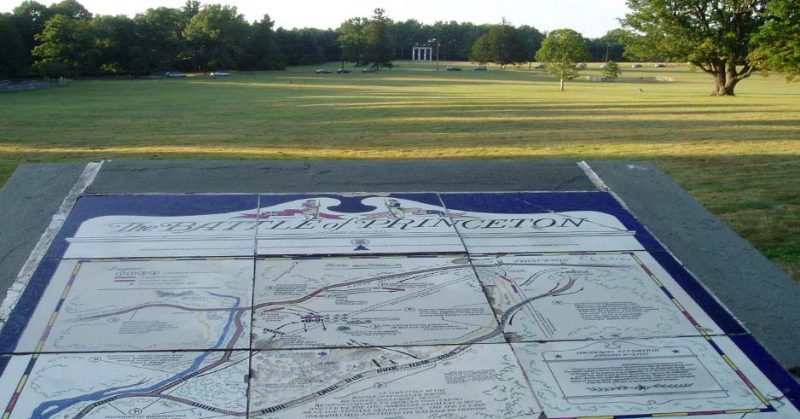The Institute for Advanced Study and the Civil War Trust reached a settlement in a long dispute over land that the school wanted to use for faculty housing. The land was part of the Battle of Princeton, a key battle in the US Revolutionary War.
The Civil War Trust has agreed to pay $4 million to purchase 14.85 acres of land commonly known as Maxwell’s Field and use it to expand the Battlefield State Park. The settlement allows the Trust to preserve 2/3rds of Maxwell’s Field and adds 1.12 acres to the north of the property which historians have recognized as being part of the battlefield.
The president of the Institute, Robbert Dijkgraaf, and the president of the Trust, James Lighthizer, released a joint statement announcing the settlement and expressing their delight in the agreement and the preservation of and enlargement of the Battlefield State Park while still providing the Institute the space they need to grow.
For their part, the Institute has agreed to reduce the footprint of their project by replacing seven single-family homes with eight additional townhouses, making sixteen townhouses. The agreement also keeps all development out of the Princeton Battlefield National Historic Landmark Boundary that was established in 1961 by the Department of the Interior.
The Institute’s housing plan had been approved by the Princeton Planning Board and the Raritan Canal Commission in 2014 and in 2015. The Princeton Battlefield Society filed a lawsuit which is still pending in the legal system. The Battlefield Society has agreed to dismiss all legal challenges once the Civil War Trust’s purchase of the land is complete.
The new compromise will need to be approved by the trustees for the Institute and for the Trust. The agreement goes into effect once all the necessary approvals have been obtained. The land will be in the state’s care until transferred to the Civil War Trust. The transfer is expected to occur in June next year.
The Princeton Battlefield Society, the National Trust for Historic Preservation, and the American Revolution Institute of the Society of the Cincinnati have all lobbied for the preservation of Maxwell’s Field. The president of the Princeton Battlefield Society, Jerry Hurwitz, said that the new agreement honors those that fought and lost their lives at that site and it protects a significant portion of the battlefield to tell the story of the Battle of Princeton and the Revolutionary War to future generations.
Senator Kip Bateman (R-Mercer, Somerset, Middlesex, Hunterdon) released a statement expressing his happiness that the agreement will preserve Maxwell’s Field. He has worked for years to prevent permanent damage being done to the site by the Institute’s building plans.
Stephanie Meeks is the president and chief executive of the National Trust for Historic Preservation. She also commended the Institute and the Trust for their work on the agreement which will enhance the ability of Maxwell’s Field to inspire future generations.
The Civil War Trust is the top non-profit battlefield preservation group in the United States. Focused primarily on Civil War battle sites, it also takes an interest in preserving battlefields from the Revolutionary War and the War of 1812. So far, the Trust has preserved over 43,000 acres in 23 states.
The Battle of Princeton was fought on January 3, 1777. It was one of the most decisive battles of the Revolutionary War. It ended a 10-day campaign that started when Gen. George Washington crossed the Delaware River on Christmas Day 1776. He scored a series of victories attacking isolated parts of the British Army. His counterattack at Princeton was the first time he defeated British regulars in the field. It re-invigorated the American drive for independence, Planet Princeton reported.
“The preservation of the Princeton Battlefield is an achievement of national importance,” said Jack Warren, executive director of the Society of the Cincinnati. “Washington’s remarkable victory at Princeton stunned the British and opened the road that led to American independence. The Princeton Battlefield is a monument to courage, resourcefulness and stubborn determination — characteristics at the heart of our national identity.”
